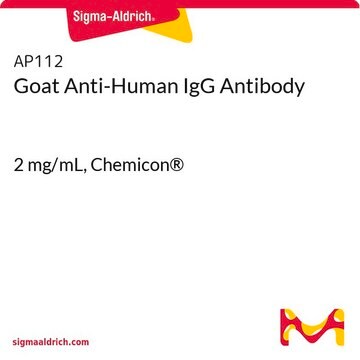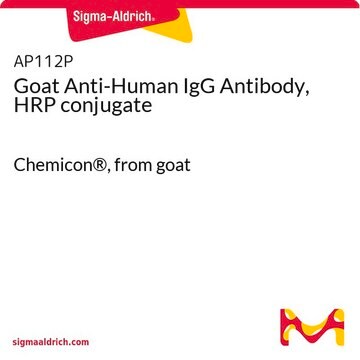SAB3701359
Anti-Human IgG (H+L)-Peroxidase antibody produced in donkey
affinity isolated antibody, lyophilized powder
Synonym(s):
HRP
Sign Into View Organizational & Contract Pricing
All Photos(1)
About This Item
UNSPSC Code:
12352203
NACRES:
NA.46
Recommended Products
biological source
donkey
Quality Level
conjugate
peroxidase conjugate
antibody form
affinity isolated antibody
antibody product type
secondary antibodies
clone
polyclonal
form
lyophilized powder
species reactivity
human
technique(s)
immunohistochemistry: suitable
indirect ELISA: suitable
western blot: suitable
shipped in
wet ice
storage temp.
2-8°C
target post-translational modification
unmodified
Related Categories
Specificity
This product was prepared from monospecific antiserum by immunoaffinity chromatography using Human IgG coupled to agarose. Assay by immunoelectrophoresis resulted in a single precipitin arc against Anti-Peroxidase, Anti-Donkey Serum, Human IgG and Human Serum.
Immunogen
Human IgG whole molecule
Physical properties
Antibody format: IgG
Physical form
Supplied in 0.02 M Potassium Phosphate, 0.15 M Sodium Chloride, pH 7.2 with 10 mg/mL Bovine Serum Albumin (BSA) - Immunoglobulin and Protease free
Reconstitution
Reconstitute with 1.0 mL deionized water (or equivalent).
Disclaimer
Unless otherwise stated in our catalog or other company documentation accompanying the product(s), our products are intended for research use only and are not to be used for any other purpose, which includes but is not limited to, unauthorized commercial uses, in vitro diagnostic uses, ex vivo or in vivo therapeutic uses or any type of consumption or application to humans or animals.
Not finding the right product?
Try our Product Selector Tool.
Certificates of Analysis (COA)
Search for Certificates of Analysis (COA) by entering the products Lot/Batch Number. Lot and Batch Numbers can be found on a product’s label following the words ‘Lot’ or ‘Batch’.
Already Own This Product?
Find documentation for the products that you have recently purchased in the Document Library.
Ami Patel et al.
Cell reports, 25(7), 1982-1993 (2018-11-15)
Synthetically engineered DNA-encoded monoclonal antibodies (DMAbs) are an in vivo platform for evaluation and delivery of human mAb to control against infectious disease. Here, we engineer DMAbs encoding potent anti-Zaire ebolavirus (EBOV) glycoprotein (GP) mAbs isolated from Ebola virus disease survivors. We
Ami Patel et al.
Nature communications, 8(1), 637-637 (2017-09-25)
The impact of broad-spectrum antibiotics on antimicrobial resistance and disruption of the beneficial microbiome compels the urgent investigation of bacteria-specific approaches such as antibody-based strategies. Among these, DNA-delivered monoclonal antibodies (DMAbs), produced by muscle cells in vivo, potentially allow the
Timothy A Bates et al.
Cell reports, 34(7), 108737-108737 (2021-02-06)
In the ongoing coronavirus disease 2019 (COVID-19) pandemic, there remain unanswered questions regarding the nature and significance of the humoral immune response toward other coronavirus infections. Here, we investigate the cross-reactivity of antibodies raised against the first severe acute respiratory
Rianne N Esquivel et al.
Molecular therapy : the journal of the American Society of Gene Therapy, 27(5), 974-985 (2019-04-10)
Zika virus (ZIKV) infection is endemic to several world regions, and many others are at high risk for seasonal outbreaks. Synthetic DNA-encoded monoclonal antibody (DMAb) is an approach that enables in vivo delivery of highly potent mAbs to control infections. We
Timothy A Bates et al.
bioRxiv : the preprint server for biology (2020-08-09)
There is currently a lack of biological tools to study the replication cycle and pathogenesis of SARS-CoV-2, the etiological agent of COVID-19. Repurposing the existing tools, including antibodies of SARS-CoV, is an effective way to accelerate the development of therapeutics
Our team of scientists has experience in all areas of research including Life Science, Material Science, Chemical Synthesis, Chromatography, Analytical and many others.
Contact Technical Service









